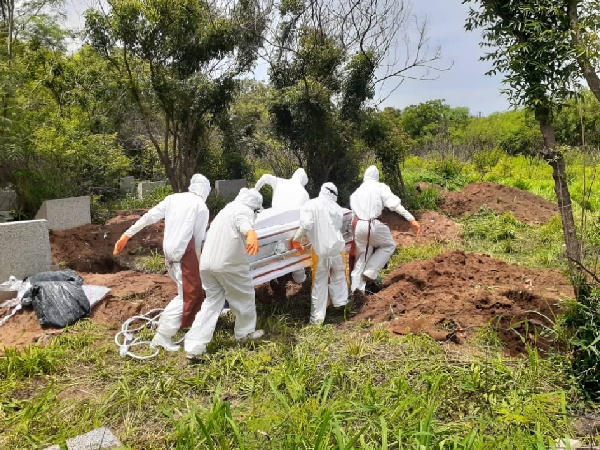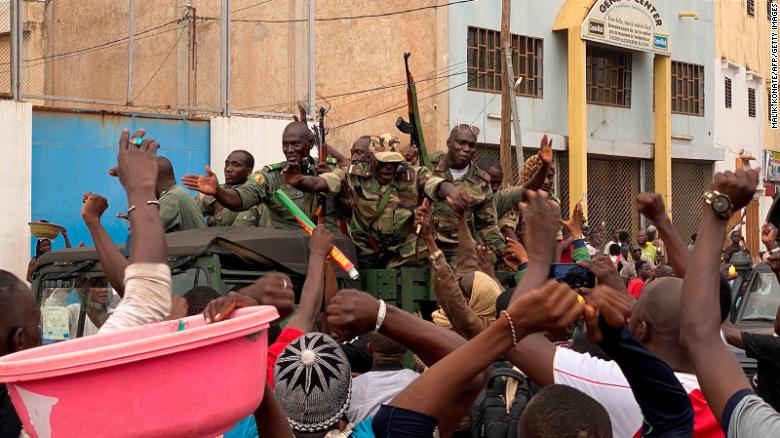Councillors accused of looting food parcels meant for the poor

The alleged incidents of corruption and food looting have been reported in eight provinces where there were claims that those in charge of the distributions – mostly ANC councillors – were not giving the food to the families that were most in need.
Government’s attempts to feed the poor and vulnerable during the extended lockdown are being hampered as opportunists – mainly local councillors – allegedly divert the aid to themselves and their supporters, and, in some instances, sell them on.
In some parts of the country, councillors have been accused of demanding food parcel donations from businesses – parcels which never reach the intended recipients.
Community activists, political parties and government officials are now warning that this opportunism is beginning to mirror the looting that took place at the time of the funeral of former president Nelson Mandela in 2013, when connected people channelled millions meant for memorials to themselves.
Then, as now, government procurement systems were relaxed to ease the purchase of goods and services.
The alleged incidents of corruption and food looting currently taking place have been reported in several provinces, where claims are being made that those in charge of the distributions – mostly ANC councillors – are not giving the food to needy families.
There are fears that food-related protests, which have flared up in some provinces, could escalate if national government does not intervene.
NORTH WEST
In Ramotshere Moiloa Local Municipality in Zeerust, two ANC councillors were suspended following allegations that they were asking for food parcel contributions from businesses, including foreign-owned ones, for personal gain.
The councillors were suspended by the ANC.
An ANC councillor from Moses Kotane municipality was due to appear in court after she allegedly sold hand sanitisers to foreign-owned shops.
Those who did not want to buy from her were allegedly threatened with closure.
The EFF and the DA in the province have accused office holders of abusing their powers and using resources meant to ease the plight of the poor during the Covid-19 coronavirus lockdown to campaign ahead of next year’s local government elections.
“Councillors are also alleged to be practising nepotism and unfair discrimination when distributing food parcels and other Covid-19 related essentials,” said EFF provincial spokesperson Jerry Matebesi.
DA provincial leader Joe McGluwa said: “Some people are seeing an opportunity in this crisis, whereby they use food parcels and other things to campaign so that they can be re-elected in the coming local government elections.
“If it is not the food parcels that are not reaching the most deserving, it is the permit that allows people to move around and help with the pandemic. This permit is being irregularly issued to people who do not really need them and for personal use.”
MPUMALANGA
This week, the EFF’s chairperson in Mpumalanga, Collen Sedibe, laid criminal charges against MPL Jeanette Thabethe and SA Social Security Agency acting regional manager Kedibone Mathebula after a truck allegedly delivered food parcels to Thabethe’s home in Tekwane South, outside Mbombela.
Sedibe alleged that the food parcels were being distributed at night to the identified ANC members’ households.
“We warned the ANC that they must not use the Covid-19 pandemic for campaigning and for cheap political point-scoring. But that warning fell on deaf ears because corruption is an epidemic in the ANC,” he said.
Police have not yet opened a docket against Thabethe, but they have launched an investigation to see if there is a case for her to answer.
Thabethe took to Facebook to defend herself against the EFF’s actions. She denied receiving the food parcels.
“Duties of MPLs or [their] mandate is law-making and public participation and to assist our communities at large. So, [Sedibe] knows what exactly I’m supposed to do as a member.
“Unfortunately, I never received a truck of food parcels,” she wrote.
An ANC councillor in the Steve Tshwete municipality in Middelburg, Musawenkosi Cheppy Masina, was arrested on April 10 for allegedly issuing fake business permits to foreign nationals in Hendrina for R300 each.
Mbombela municipality has launched an investigation after receiving substandard sanitisers which did not have enough alcohol content as required by law.
A whistle-blower alleged that sanitisers were made in garages by the suppliers.
LIMPOPO
Lazarus Baloyi, an ANC ward councillor in Collins Chabane municipality in Malamulele, is facing a police investigation after he was accused of selling proof of residence documents for R300 to community members.
The ANC condemned his actions, with council Speaker Madume Lebea writing to Baloyi, ordering him to stop.
In a handwritten response, Baloyi said: “The allegations against me are baseless and lack substance.”
GAUTENG
The SA National Civic Organisation (Sanco) in Tshwane has also accused officials of handing out parcels to their families instead of the poor. Sanco’s regional chairperson, Abraham Mashishi, told City Press on Saturday that he had laid a case of fraud and corruption against provincial department of social development officials with the Silverton Police Station.
“These officials go to distribution centres under the guise of giving people all over Tshwane food parcels. But they only go to certain parts of the city, such as Mamelodi, while the rest of Tshwane suffers,” said Mashishi.
“Sanco has been reliably informed that fraudulent elements have been taking part in the distribution of groceries as part of the relief for the poor in the Greater Tshwane region … There have been endless lists of the poorest of the poor who need groceries, but officials are conniving with politicians to advance their narrow and selfish agendas.”
ANC councillors have been accused of distributing food parcels only to their own constituencies in Tshwane and Emfuleni, excluding those who are most in need but who reside in wards controlled by the opposition.
The DA’s Gauteng spokesperson on social development, Refiloe Nt’sekhe, claimed that five DA wards in the Emfuleni municipality had been excluded from the distribution of food parcels while all the ANC wards were benefiting.
KWAZULU-NATAL
Community leaders and activists in KwaZulu-Natal have questioned the roll-out of food parcels to indigent communities.
Edwin Mkhize, the provincial secretary of labour federation Cosatu, told City Press that he felt the process of distributing the parcels had not been transparent and that communication had been poor.
There was also sheer incompetence that had to be considered, he added.
“It has been said that in every crisis, there is an opportunity. I have not personally seen any corruption taking place regarding food parcel distribution in the province, but I have had calls from community members who have alleged corruption, saying that the parcels in some wards have been distributed according to political factions, or that they are going to families who are known to vote a certain way.”
Activist Mary de Haas said she had received information from different parts of the province about councillors handing out food parcels meant for the poor “to their families, friends and allies, and are excluding other hungry people who are not in that category”.
Most of these complaints came from the Midlands, areas around Pietermaritzburg, and Durban townships.
“Among those making these allegations are ANC supporters who are disgusted with what is happening in their communities. There are even allegations that food is being secretly stockpiled to win support from ANC members during branch general meetings, with a view to promoting their chances of being elected as candidates in next year’s local government elections, and in the Moses Mabhida area’s regional leadership. Many thousands of impoverished hostel dwellers appear to have been totally excluded from any assistance.”
De Haas said the consequence of hunger, and resentment over who received food aid, had communities worried that this might “erupt into violence”.
Vusi Zweni, chairperson of the hostel movement Ubunye Bamahostela, said: “This lockdown has people worried. They are hungry. While I don’t have the figures, there is a high prevalence of HIV/Aids and TB among the hostel dwellers. You can see it. These people need food to take their medication. We, as an organisation, are doing what we can [to fill the void]. We provide items to local hostel leaders, who then distribute them to the most vulnerable – items such as maize, cooking oil and rice; small things to help them through.”
Mhlaba Memela, spokesperson for the provincial department of social development, said the department was focusing its distribution efforts in various areas, including informal settlements, townships and rural areas.
“Some people say they are being excluded from the whole process. But there is nothing that the provincial government can do, or the department, because it is [the responsibility of] district structures and councillors to identify people per ward [who are in need of parcels]. The list of who needs food then comes to the department.”
He said he was aware of allegations of employed “opportunists” who tried to access the food parcels for themselves or to sell them. “Some of them are teachers or nurses who can afford to buy their own food … People will always find a way to manipulate the system, but they will be caught as what they are doing is criminal.”
EASTERN CAPE
United Democratic Movement leader Bantu Holomisa has accused ANC ward councillors of not fairly distributing food parcels to the needy.
Speaking to City Press on Saturday, after protests broke out over food parcel distribution in Ngangelizwe, Mthatha, Holomisa said: “The problem is that their [ANC councillors] criteria is not clear in terms of who should get these food parcels. They choose their own people.”
Nkosi Fundi Mtirara, who heads many villages around Mthatha, said villagers had not seen any food parcels.
“I have been inundated with calls by many people in the villages who are visiting me every day asking for food parcels. We hear the parcels have been given to ward councillors, but they never reach the intended beneficiaries. We only see them on TV. We don’t know where they end up.”
NORTHERN CAPE
Bronwyn Thomas-Abrahams, spokesperson for Northern Cape premier Zamani Saul, told City Press that the province was facing severe food shortages and it had been found that beneficiary lists had not been collated accordingly.
“Upon reassessment, the department of social development has found the beneficiary lists submitted by some councillors to be flawed,” she said.
BBC





